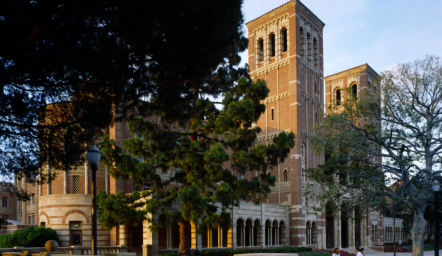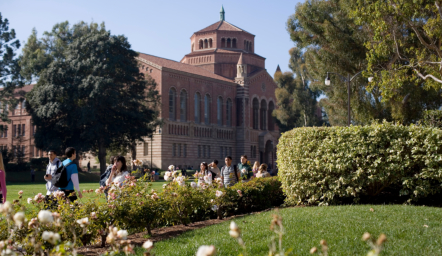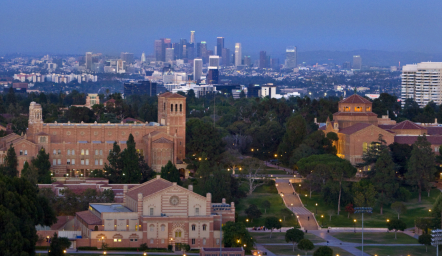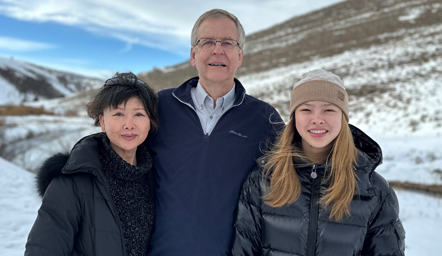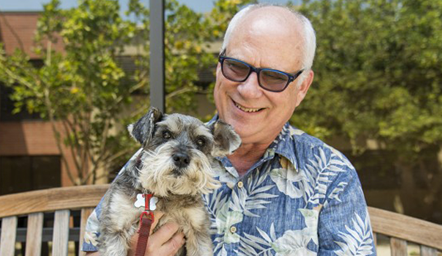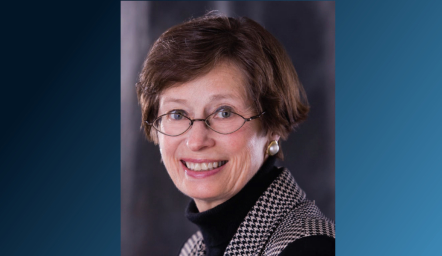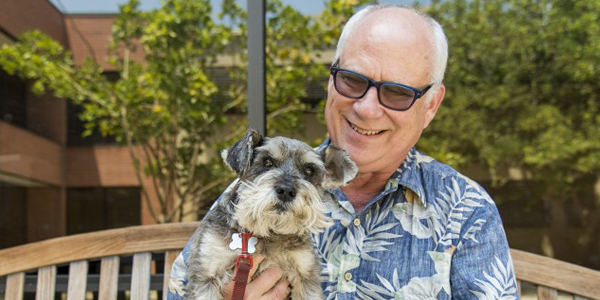Donor Story
Composing a Legacy
Mark Carlson '78, '84, started composing music when he was five years old,
the year his mother gave him his first piano lessons. "My siblings and I
were all required to play piano and then another instrument of our choice,"
Mark recalls. "My mother actually notated my first compositions that were
from around that same time."
Mark's second instrument—picked at age eight—was the flute, and later he
learned to play the organ. But it was the flute that became Mark's primary
performing instrument, and he continued to write "little pieces of music"
through his adolescence and beyond. It wasn't until he became a graduate
student at UCLA, however, that his talents as a composer truly blossomed.
Student days – "I first attended
Johnston College at the University of Redlands for two years before
transferring to California State University, Fresno." Mark remembers,
"Fresno State was full of excellent faculty and student musicians. Johnston
College was a brand-new experimental college founded on principles of
humanistic psychology, and it had a profound impact on my life, including a
huge impact on my teaching style."
While earning a bachelor's degree from CSU Fresno, Mark worked as an extra
flutist at the Fresno Philharmonic, brought in when a bigger flute section
was needed. At the same time, he studied with Roger Stevens, principal
flutist of the LA Phil, driving down to Los Angeles every two or three weeks
for lessons. At age 22, he moved to L.A. to continue studying with him.
There, Mark soon connected with his future UCLA mentor and music professor,
Alden Ashforth. They met at USC during a conference in honor of the
centennial of famed composer and former UCLA professor Arthur Schoenberg.
Mark began auditing Ashforth's classes before officially applying to UCLA,
where he was accepted as a graduate student in music theory and
composition. "I just always at the core of my being wanted to be a
composer," Mark recalls. "Years later, I asked Alden, 'Why did you even take
me? The pieces I submitted were terrible.' And he said, 'I know, but we
recognize talent and thought you were worth accepting.'"
At the time Mark was studying under Ashforth and Paul Reale, composition
students did not have a performance requirement, and there were few
opportunities to premiere original pieces. Luckily, Mark was commissioned to
compose an eight-song cycle for the United States Bicentennial celebration
held at UCLA's Schoenberg Auditorium in May 1976.
"I worked on those eight songs for months," Mark recalls. "When I finished,
my professors were agog, and I knew it was good. That was a
major turning point for me. It was an extraordinary
experience, and I never stopped composing from that point on."
A proud professor – After Mark
completed his master's and doctorate degrees in music theory and
composition, he served as an adjunct professor at UCLA for 28 years. "The
bulk of my adult life was spent at UCLA. It's been my second home," the
Modesto, California, native says. "I did a lot of composing on campus."
While Mark has seen UCLA's music program grow and mature into the robust
and nationally competitive school of music it is today, he notes that UCLA
has always provided an exceptional theory program and a renowned music
library. Today, UCLA also offers Bruin composers plenty of performance
opportunities to bring their original pieces to life.
Mark believes UCLA's commitment to artistic freedom has always set the
music program apart from other institutions. For example, as a graduate
student, he was able to pursue the beautiful melodies he loves, even though
atonal music was en vogue at the time. "Unlike most academic
settings in composition where you have to conform to what music is
'supposed to be,' UCLA has always been a place where a budding composer can
find the right teacher who will support their personal, aesthetic vision,"
he says.
During Mark's years as an adjunct professor, he taught undergraduate
students in every specialization-performance, music history,
ethnomusicology, jazz, music education, and composition. But the students
who studied composition with him were almost exclusively undergraduate
composition majors. Some of his students, including Jon Daversa, a
multi-Grammy winning jazz trumpet player and composer, went on to academic
careers of their own. Daversa is the current head of the Frost School of
Music in Miami.
"To this day, undergraduate composition students are the least well-funded
in the music department," Mark says. "I remember losing talented potential
students to other institutions that were able to offer full scholarships
when UCLA could not. It was heartbreaking. After I'm gone, I hope that
whatever I have left will be of value to promising students who need
financial help to make good music."
To this end, Mark has included a bequest in his estate plan for the UCLA
Herb Alpert School of Music to establish the Pacific Serenades endowed
scholarship fund for undergraduate composition students. This scholarship is
named for the nonprofit organization he founded and ran for 34 years and
that, in an effort to give more exposure to West Coast talent, commissioned
and premiered 113 pieces by local composers and presenting their premieres
alongside standard repertoire in intimate concert settings, emphasizing
Southern California musicians.
"Part of my immediate motivation to give to UCLA is that I don't have
children," Mark says. "My siblings, if they outlive me, will not need
anything from me financially. So, I'd rather give to people who will get
some use out of this gift at the beginning of their lives, when it will spur
them on to do more of what they want with their lives."
Supporting young musicians has always been a priority for Mark, who began
teaching music at the age of 15, when he gave his first flute lesson. "It's
been a part of my being," he says. "The whole inspiration to move people
has been central to my life. Most composers write pieces and hope they will
be performed. I have been very fortunate to write music that I knew was
going to be performed, rather than to write something and shop it around,
hoping for a performance. My wish is for this scholarship to make these
dreams a reality for our future undergraduate students."
